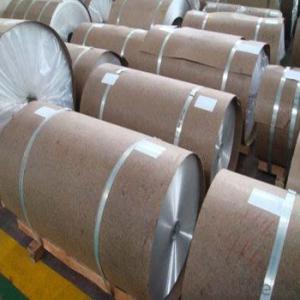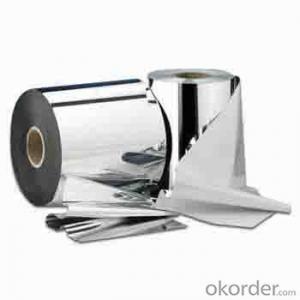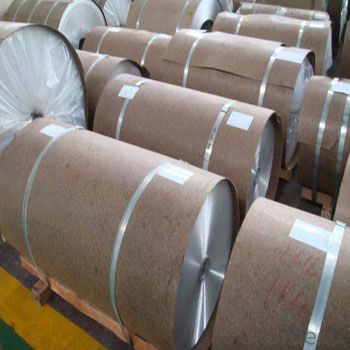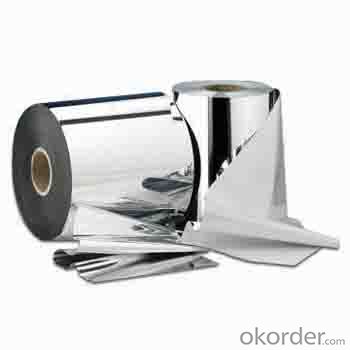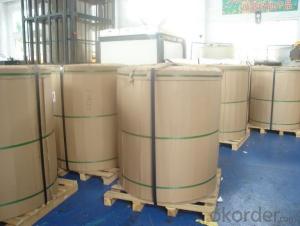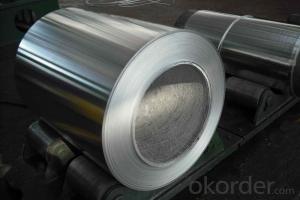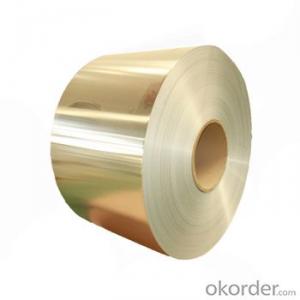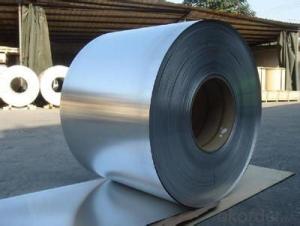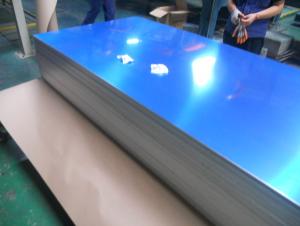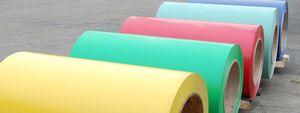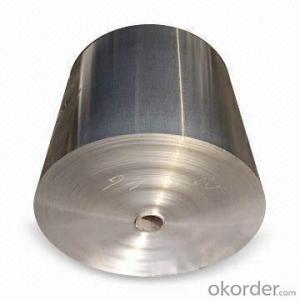Coiled Aluminum Direct Casting DC Coils and Rolls
- Loading Port:
- Shanghai
- Payment Terms:
- TT or LC
- Min Order Qty:
- 50 m.t.
- Supply Capability:
- 50000 m.t./month
OKorder Service Pledge
OKorder Financial Service
You Might Also Like
1.Specification
ALUMINIUM COIL
ALLOY: AA1***
AA3***
AA5***
TEMPER: H14 H16 H18 H22 H24 H26 H32 O/F
THICKNESS:0.03MM-3.0MM
WIDTH: 30MM-1700MM
COATING: PE(POLYESTER),PVDF,EPOXY
STANDARD: GB/T 17748-1999
2.Description
In Europe aluminium experiences high rates of recycling, ranging from 42% of beverage cans, 85% of
construction materials and 95% of transport vehicles.Recycled aluminium is known as secondary aluminium, but maintains the same physical properties as primary aluminium. Secondary aluminium is produced in a wide range of formats and is employed in 80% of alloy injections. Another important use is for extrusion.
White dross from primary aluminium production and from secondary recycling operations still contains useful quantities of aluminium that can be extracted industrially.The process produces aluminium billets, together with a highly complex waste material. This waste is difficult to manage. It reacts with water, releasing a mixture of gases (including, among others, hydrogen, acetylene, and ammonia), which spontaneously ignites on contact with air;contact with damp air results in the release of copious quantities of ammonia
gas. Despite these difficulties, the waste has found use as a filler in asphalt and concrete.
3.Why you can choose us?
We can promise the best quality and price!
4.Pictures
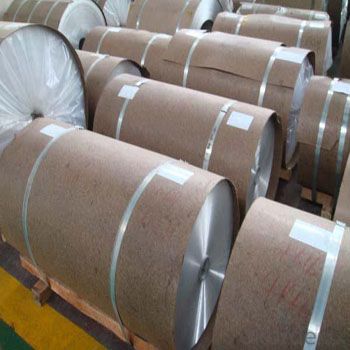
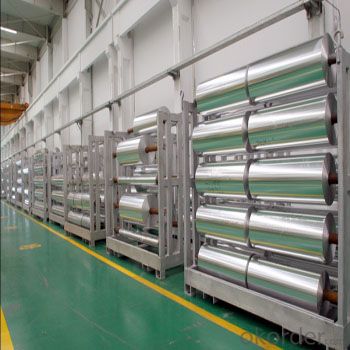
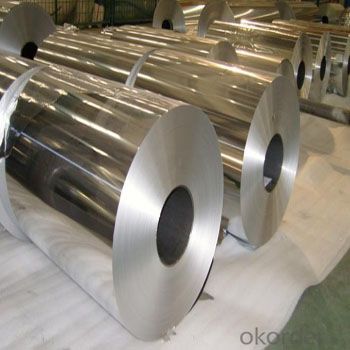
5.FAQ:
1)what is aluminum?
Aluminium (or aluminum; see spelling differences) is a chemical element in the boron group with symbol Al and atomic number 13. It is a silvery white, soft, nonmagnetic, ductile metal. Aluminium is the third most abundant element (after oxygen and silicon), and the most abundant metal in the Earth's crust. It makes up about 8% by weight of the Earth's solid surface.
Aluminium metal is so chemically reactive that native specimens are rare and limited to extreme reducing environments. Instead, it is found combined in over 270 different minerals.The chief ore of aluminium is bauxite.
2)What's kind of payment term we can supply?
CIF,CFR, FOB and other.
3)Can we supply samples?
Yes, we can!
- Q: Can aluminum coils be used in the production of aluminum sandwich panels?
- Yes, aluminum coils can be used in the production of aluminum sandwich panels. Aluminum coils are typically used as the outer layers of the sandwich panel to provide durability, weather resistance, and aesthetic appeal. These coils are usually coated or painted to enhance their performance and appearance. The aluminum coils are then bonded to a core material, such as a non-aluminum material like polyethylene or mineral-filled thermoplastic, to create the sandwich panel structure.
- Q: Is it possible to use aluminum coils as a material for crafting jewelry?
- <p>Yes, aluminum coils can be used to make jewelry. Aluminum is a lightweight, durable, and affordable metal that is often used in costume jewelry and art pieces. It's easy to work with, allowing for intricate designs and shapes. However, it's important to note that aluminum is not as valuable or as resistant to tarnishing as precious metals like gold or silver, so it may not be suitable for high-end or long-lasting jewelry pieces.</p>
- Q: What are the different yield strengths of aluminum coils?
- The grade or alloy of aluminum used can cause variability in the yield strength of aluminum coils. Aluminum is available in various grades, including 1100, 3003, 5052, and 6061, among others. Each grade possesses its own unique properties, which include differing yield strengths. For example, the 1100 grade of aluminum exhibits a relatively low yield strength of approximately 12,000 psi. This particular grade is typically utilized in general-purpose applications where high strength is not a primary requirement. Conversely, the 6061 grade of aluminum demonstrates a considerably higher yield strength of around 35,000 psi. This grade is commonly employed in structural applications or scenarios that demand greater strength and durability. It is important to acknowledge that the yield strength of aluminum coils can also be influenced by factors such as material thickness and temper. Generally, thicker coils possess higher yield strengths, while various tempering processes can further enhance the strength and other mechanical properties of the aluminum. To summarize, the yield strength of aluminum coils can vary due to the grade, thickness, and temper of the material. When selecting the appropriate aluminum coil for specific applications, it is crucial to consider these factors to ensure optimal performance and structural integrity.
- Q: What is the lifespan of aluminum coils?
- The lifespan of aluminum coils can vary depending on various factors such as the quality of the aluminum, the manufacturing process, the environmental conditions they are exposed to, and the maintenance provided. However, on average, aluminum coils can last anywhere from 15 to 30 years. With proper care and regular maintenance, including cleaning and inspection, aluminum coils can potentially have an extended lifespan. It is important to note that regular maintenance and servicing by professionals can help identify any issues early on, allowing for timely repairs or replacements, ultimately prolonging the lifespan of aluminum coils.
- Q: How are aluminum coils used in the production of musical instruments?
- The unique properties and advantages of aluminum coils make them widely used in the production of musical instruments. Guitar pickups are one of the main applications for these coils, as they are wound around a magnetic core and capture the vibrations of the guitar strings, converting them into electrical signals. Aluminum's electromagnetic properties make it an excellent material for this purpose, allowing for precise sensing and amplification of the instrument's sound. Not only are aluminum coils used for guitar pickups, but they are also utilized in the manufacturing of other instruments such as electric keyboards, synthesizers, and electric violins. These coils are crucial for generating and transmitting sound signals, ensuring high-quality audio output. Aluminum's lightweight nature is preferred as it doesn't add unnecessary weight to the instrument, making it easier to handle and more portable. Furthermore, aluminum coils are employed in constructing wind instruments like saxophones and trumpets. They are used to shape the tubing and form the body of these instruments. Aluminum's corrosion resistance is particularly valuable in this application, as it helps maintain the instrument's durability and longevity. In summary, aluminum coils play a vital role in the production of musical instruments by providing a reliable means of capturing, transmitting, and amplifying sound signals. Their unique properties, including electromagnetic sensitivity and corrosion resistance, make them ideal for ensuring high-performance and longevity in various musical instruments.
- Q: How are aluminum coils used in the production of power transmission lines?
- Due to their unique properties and benefits, aluminum coils are extensively used in the production of power transmission lines. These coils, typically made from high-quality aluminum alloys, offer excellent conductivity, strength, and corrosion resistance. A key application of aluminum coils in power transmission lines is their use in manufacturing overhead conductors. These conductors transmit electrical energy from power plants to substations and distribution networks. Aluminum coils are used to create the conductive core of these overhead conductors because aluminum has lower resistance compared to metals like copper. This low resistance allows for efficient electricity transmission over long distances, minimizing energy loss and improving system performance. In addition, aluminum coils are lighter than copper coils, making them easier to handle and install. This characteristic significantly reduces transportation, installation, and maintenance costs of power transmission lines. Consequently, aluminum coils have become the preferred choice for overhead conductors in power transmission systems worldwide. Moreover, the corrosion resistance of aluminum coils ensures the long-term durability and reliability of power transmission lines. Aluminum naturally develops a protective oxide layer that prevents further corrosion, even in harsh environmental conditions. This corrosion resistance extends the lifespan of transmission lines, reducing the need for frequent repairs or replacements. In conclusion, aluminum coils play a vital role in the production of power transmission lines. They enable efficient electricity transmission, reduce costs, and provide long-lasting corrosion resistance. With these advantages, aluminum coils have become widely adopted in the power industry to enhance the performance and reliability of power transmission systems.
- Q: What are the common sizes of aluminum coils available?
- The common sizes of aluminum coils available vary depending on the specific application and industry. However, some standard sizes include widths ranging from 36 inches (91 cm) to 72 inches (183 cm) and thicknesses between 0.019 inches (0.048 cm) to 0.125 inches (0.318 cm). These sizes are commonly used in industries such as construction, automotive, and manufacturing.
- Q: How does the gauge of aluminum coils affect their performance?
- The gauge of aluminum coils directly influences their performance. Thicker gauge coils are more durable and resistant to physical damage, making them suitable for heavy-duty applications that require high strength and durability. On the other hand, thinner gauge coils are lighter and more flexible, making them more suitable for applications that require flexibility and ease of bending. Additionally, the gauge also affects the thermal conductivity and electrical resistance of the coils, with thinner gauges offering higher conductivity. Therefore, the gauge of aluminum coils plays a crucial role in determining their performance characteristics and suitability for specific applications.
- Q: Can aluminum coils be used in the production of military equipment?
- Indeed, the utilization of aluminum coils in the manufacturing of military equipment is possible. The utilization of aluminum, a lightweight and long-lasting substance, provides numerous benefits for military applications. Its high strength-to-weight ratio renders it a popular choice for constructing military vehicles, aircraft, and naval vessels. Aluminum coils possess the capacity to be molded into diverse shapes and sizes, making them adaptable for fabricating various components such as armor plating, weapon systems, and structural parts. Furthermore, aluminum exhibits commendable resistance to corrosion, a crucial attribute for military equipment operating in harsh environments. In general, aluminum coils are a dependable and extensively employed material in the production of military equipment.
- Q: What are the different coil packaging options for aluminum coils?
- There are several different coil packaging options available for aluminum coils, depending on the specific requirements and preferences of the customer. One common packaging option is the wooden crate. Aluminum coils can be securely stored and transported in wooden crates, which provide excellent protection against damage during handling and shipping. These crates are typically made of sturdy wood and are designed to safely hold the coils in place, preventing any movement or shifting that could lead to dents or scratches. Additionally, wooden crates are often equipped with metal bands or straps to further secure the coils and ensure their integrity. Another popular packaging option is the steel cage. Steel cages are durable and offer exceptional protection for aluminum coils. These cages are typically made of heavy-duty steel and are designed to withstand the rigors of transportation and storage. Like wooden crates, steel cages are equipped with straps or bands to secure the coils in place and prevent any movement or damage. In addition to wooden crates and steel cages, aluminum coils can also be packaged using stretch wrap or shrink wrap. Stretch wrap consists of a plastic film that is tightly wrapped around the coils, creating a secure and protective layer. Shrink wrap, on the other hand, is a plastic film that is heated and shrinks tightly around the coils, providing a tight and secure packaging solution. Both stretch wrap and shrink wrap offer good protection against dust, moisture, and other environmental factors. Lastly, some companies may opt for special coil packaging options, such as custom-made crates or containers, to meet their specific needs. These customized packaging solutions can be tailored to accommodate the size, weight, and other unique requirements of the aluminum coils, ensuring maximum protection during transportation and storage. Overall, the different coil packaging options for aluminum coils include wooden crates, steel cages, stretch wrap, shrink wrap, and customized packaging solutions. Each option offers varying levels of protection, allowing customers to choose the packaging method that best suits their specific needs and budget.
Send your message to us
Coiled Aluminum Direct Casting DC Coils and Rolls
- Loading Port:
- Shanghai
- Payment Terms:
- TT or LC
- Min Order Qty:
- 50 m.t.
- Supply Capability:
- 50000 m.t./month
OKorder Service Pledge
OKorder Financial Service
Similar products
Hot products
Hot Searches
Related keywords
